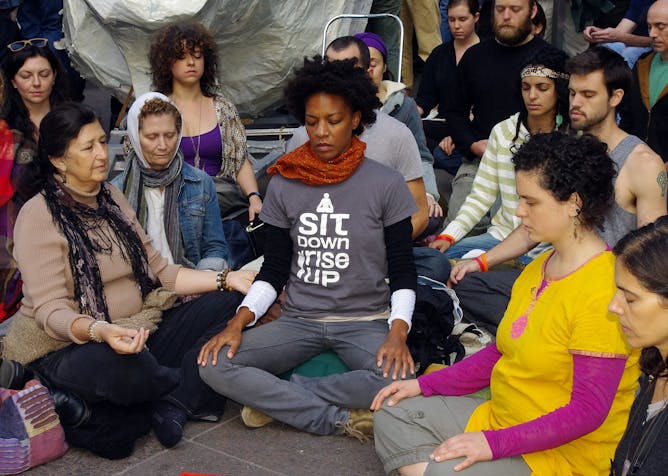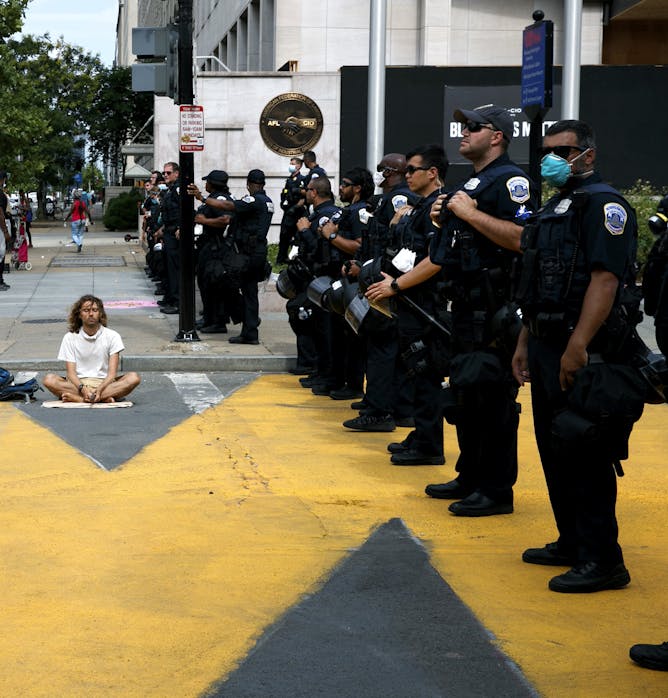|
|
|
|
The killing of George Floyd last May sparked a global protest movement calling for an end to racism and police brutality. But it also surfaced a lot of pain for those who deal with racism every day. Where do we go from here?
In Episode 2 of our new podcast, Don’t Call Me Resilient, I speak with writer, activist and Zen priest Reverend angel Kyodo williams about the pain of racism, and how she uses meditation to combat it — and become a stronger anti-racist activist.
As part of podcast, we highlight articles that drill down into the topics we discuss in the episode. Today in The Conversation Canada, Karen Ragoonaden of the University of British Columbia explains how mindfulness practices can help us navigate the unsettling realities of racial injustice.
We hope you'll listen to the latest episode and read the article.
Also today:
Regards,
|
Vinita Srivastava
Producer | Director of Innovation | Senior Editor, Culture + Society
|

|
|
Don't Call Me Resilient: Episode 2
|

Protesters at Liberty Park on Oct. 16, 2011, Day 31 of Occupy Wall Street in New York.
David Shankbone/The Occupy Wall Street Creative Commons Project
Vinita Srivastava, The Conversation
The writer and zen priest Reverend angel Kyodo williams speaks about the pain of racism, how she uses meditation to combat it - and become a stronger anti-racist activist in America today.
|

A man meditates on the road by a police line as demonstrators protest on the section of 16th Street renamed Black Lives Matter Plaza, June 23, 2020, in Washington.
(AP Photo/Jacquelyn Martin)
Vinita Srivastava, The Conversation; Anowa Quarcoo, The Conversation; Ibrahim Daair, The Conversation
This is the full transcript for Don't Call Me Resilient, EP 2: How to deal with the pain of racism - and become a better advocate.
|

People take part in a mass meditation on the lawn of Parliament Hill in Ottawa in 2017.
THE CANADIAN PRESS/Sean Kilpatrick
Karen Ragoonaden, University of British Columbia
Mindfulness practices may help one examine long-held cultural assumptions, allowing one to better respond to current critical issues such as climate change and systemic racism.
|
Today's Featured Articles
|

Seattle earthquake damage is seen in 2001.
Seattle Municipal Archives.
Glenn McGillivray, Western University; Mary Kelly, Wilfrid Laurier University
Even though Canadians and Americans living in the Pacific Northwest share the same earthquake risk, far more Canadians than American homeowners buy earthquake insurance. Why?
|

Our beliefs about our romantic partner act like a pair of tinted glasses that colour our experience of our partner.
(Shutterstock)
Jesse Lee Wilde, Western University; David J. A. Dozois, Western University
People create beliefs about their romantic partner that affect how they respond to them and interpret their behaviour. These beliefs can act as rose-tinted glasses, or as a darker lens.
|

Tamara Dus, director of University Health Network Safety Services, administers a Pfizer-BioNTech COVID-19 vaccine in Toronto.
THE CANADIAN PRESS/Frank Gunn
Byram W. Bridle, University of Guelph
The arrival of COVID-19 vaccines has raised hope for an end to the pandemic. Hopefully that's true, but there are variables. Here are some factors that could affect the success of the vaccine rollout.
|
La Conversation Canada
|

La pandémie a mis en lumière les conditions déplorables de travail des infirmières, qui sont plus nombreuses que jamais à quitter la profession.
Shutterstock
My An Nguyen, Université de Montréal; Bryn Williams-Jones, Université de Montréal; Sihem Neila Abtroun, Université de Montréal
Le temps supplémentaire obligatoire chez les infirmières devait être une mesure d’exception. Il est plutôt devenu une méthode de gestion, ce qui leur cause des torts considérables.
|

Nos perceptions de notre partenaire agissent comme une paire de lunettes teintées qui colorent notre relation de couple.
shutterstock
Jesse Lee Wilde, Western University; David J. A. Dozois, Western University
L’image que l’on se fait de notre partenaire influence nos interactions et la façon dont nous interprétons ses comportements. La relation dépend de nos lunettes, qui sont sombres ou teintées de rose.
|
| |
| |
| |
| |

|
| |
| |
| |
| |
| |
| |
| |
| |
|
|
|
|
|
|
|